Top 6 Enterprise CRMs

Ask any leader of an enterprise-level company what’s most important, and you’ll probably get the same answer: it’s the customers – without whom there are no sales, no revenue, and no business. Yet, many enterprise companies struggle to understand their customers and their concerns. They have issues communicating through the channels their customers are most interested in and delivering marketing content that moves the needle.
Without the right tools to gather knowledge about your customers and leverage it appropriately, it’s impossible to prioritize them properly. Whether you’re converting new leads or trying to retain clients you’ve had for years, a good Customer Relationship Management (CRM) solution can improve customer interactions on every level.
Any company can benefit from a CRM and derive a positive ROI by using it to support their marketing, sales, and customer service teams. Still, you really can’t overstate how important it is for B2B companies. Building trust and ongoing dialogue with your customers and developing a deep understanding of their needs and challenges is the very definition of CRM. Having a robust, scalable software solution designed to handle these activities is an essential component of a successful B2B sales strategy.
Today, CRM is the fastest-growing software market, with more than nine out of ten companies with eleven or more employees using a CRM solution. It’s not enough just to have one in place — you need to make sure your CRM is the right fit for the size and scope of your organization. When it comes to a large, enterprise-level organization, employing the right CRM becomes critical.
Read on for a rundown of the key benefits and special features of the top six CRM solutions for enterprise businesses.
What is an Enterprise CRM?
Large organizations with hundreds or even thousands of employees are referred to as enterprises. These companies usually have enormous budgets, allowing them to be more flexible with their technology spending. As a result, enterprise-level businesses will typically seek out a top-of-the-line product designed to provide a comprehensive answer to any challenges they may have. These are typically knowledge-intensive solutions.
As previously noted, CRM stands for Customer Relationship Management. Standard CRM software functions as a customer information database: their profile, purchase history, and interactions with the company. Analytics and reporting tools are frequently integrated into the CRM.
Enterprise CRM software is designed to provide shared access to customer data across multiple departments in large, complex organizations. Enterprise-level business solutions often include various tools and customization options, allowing the software to handle a wider range of automated tasks.
For small businesses where salespeople are the primary users of customer data, standard CRM solutions may suffice. Businesses with more than one team or department that needs to work with customer data are the target market for enterprise CRM solutions.
But just because a CRM is built for enterprise doesn’t necessarily mean it won’t work well for smaller organizations. When sales and marketing need to work in close alignment to convert leads, as is often the case in B2B sales, an enterprise CRMs advanced functionality can be worth the investment.
Enterprise CRM Features
Any CRM solution will consist, at minimum, of contact management: a database where customer information can be recorded and organized. Enterprise CRM solutions often include some or all of the following features:
- Marketing campaign management
- Lead scoring and management
- Sales analytics and forecasting
- Analytics and reporting dashboard
- Sales and marketing automation
- Integrations with other tools and platforms
- Cloud hosting with mobile access
Not surprisingly, enterprise CRMs cost more than the standard variety. Depending on the needs of your business, a less expensive solution isn’t necessarily going to provide a better ROI.
Why Use a Top Enterprise CRM?
One of the best reasons to use an enterprise CRM is saving time and running your operations more efficiently. Many solutions automate data entry and workflows. The improved data accessibility provided by an enterprise CRM can shorten your sales cycle by as much as 14%.
Companies that rely on customer data to run effective account-based or personalized marketing campaigns can benefit greatly from enterprise CRM features like sales analytics, customer segmentation, and social media integrations. At the same time an enterprise CRM is helping you turn leads into new customers, it can also improve customer retention by providing your support teams with better tools and richer data.
An enterprise CRM database can also be a treasure trove of sales opportunities when using attribution-based personalization software to find the purchasing journeys hidden within your customer data.
How to Choose the Best Enterprise CRM for Your B2B
Once you’ve chosen to invest in an enterprise CRM solution, your difficult decisions are far from over. You still have to select the one that is right for your business.
The first step is to determine what your goals are and how an enterprise CRM will help you meet them. Your goals will help you create lists of must-have features and ones you can live without. You also want to be sure ahead of time that you have sufficient staffing available to learn and utilize the higher functions of the CRM.
Another consideration is whether or not the CRM has integrations with any of the other software you’re currently using, particularly marketing and communications tools. Depending on the solutions involved and how essential they are to your operations, the CRM’s ability to integrate with them can either be a nice bonus or an absolute necessity.
Top 6 Enterprise CRMs
Whether you are a B2B marketer for an enterprise-level organization or a small business with big needs, these are the game-changing CRMs to look into.
1. Oracle E-Business Suite CRM
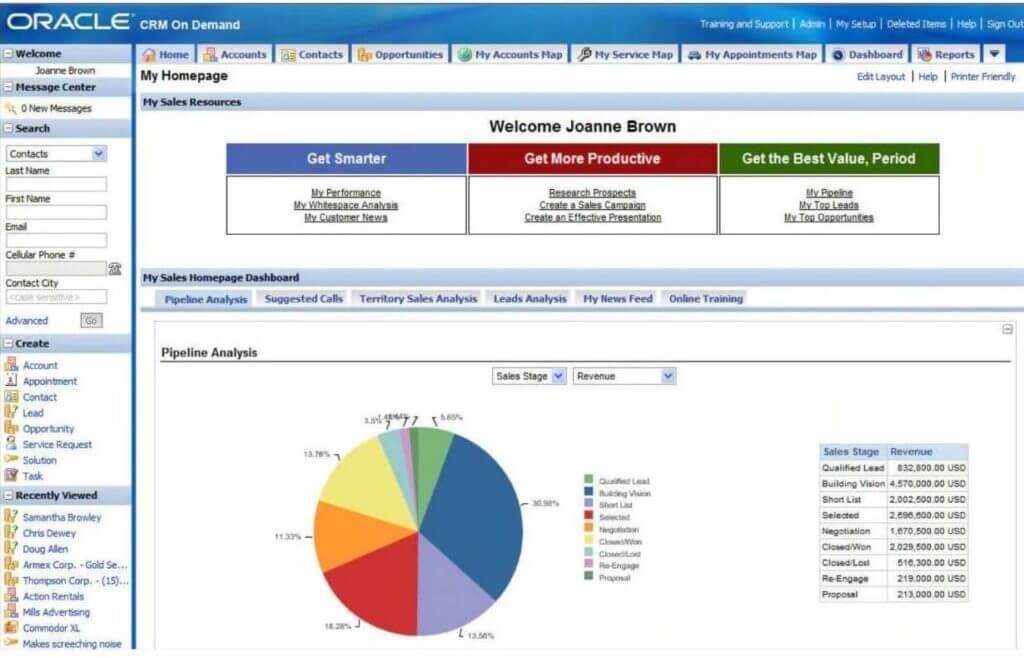
Oracle has been in the CRM game for a long time. Their solution offers an easy-to-use (if somewhat dated) interface and highly secure cloud storage. It also hosts specialized data management features for specific industries like manufacturing, technology, and wealth management. A solid array of sales and marketing tools and a deep bench of integration possibilities keep this venerable solution on many enterprise marketers’ desktops.
Price: By request
Reviewer Says: “The interface is very old school, but the capability is very good. Cheap compared to competitors.”
2. Salesforce Sales Cloud
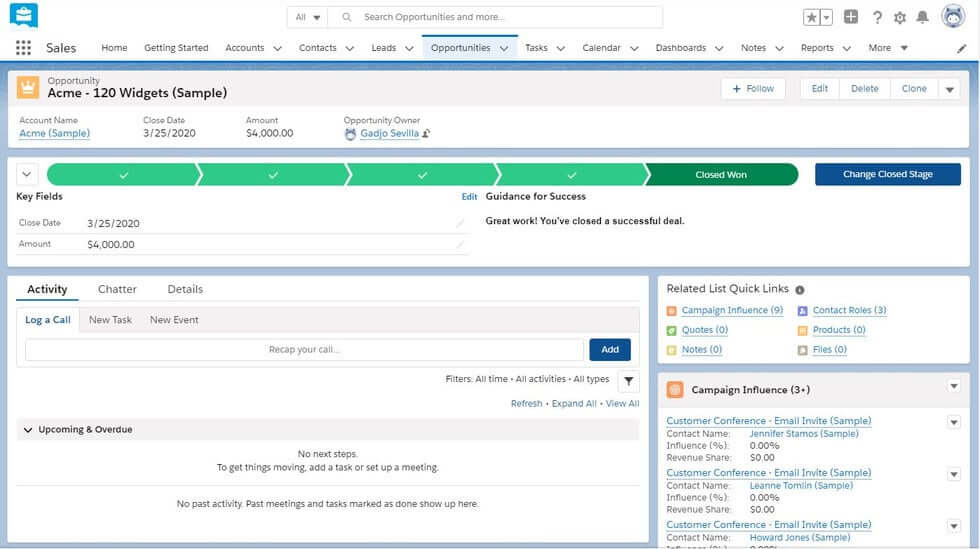
For many users, Salesforce is virtually synonymous with CRM. They offer solutions for all types of businesses, including a powerful, feature-packed version for enterprises. Not surprisingly, many of Sales Cloud’s features are geared toward sales and marketing. The CRM will even deploy artificial intelligence to point out sales opportunities you might be missing. Just be warned that the initial setup and customization can be challenging.
Price: Enterprise Edition starts at $150 per user, per month.
Reviewer Says: “Since transitioning to Salesforce Sales Cloud, we have been able to build and automate complex processes to reduce redundant tasks, mitigate error, and provide an exceptional customer experience for our constituents.”
3. HubSpot Sales Hub Enterprise
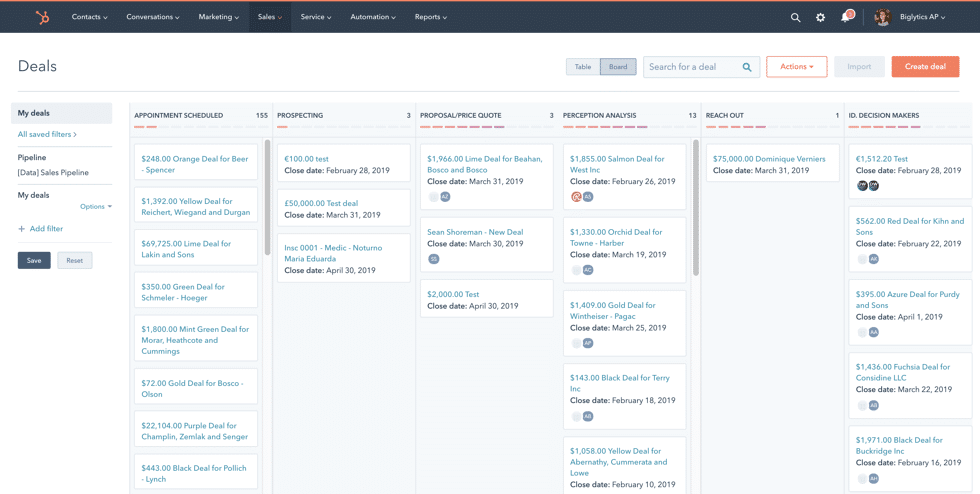
HubSpot offers a simple, user-friendly interface without compromising on the depth and power of its functionality. Still, when you start looking at the highly desirable add-on features for marketing, customer service, and content management, it can end up being one of the priciest options. But if that’s no deterrent, Sales Hub can be part of an excellent all-in-one solution that integrates with hundreds of different third-party tools, including Trendemon.
Price: Enterprise version starts at $1,200 per month for ten users.
Reviewer Says: “The best feature of HubSpot is creating email templates for the sequences and sending out multiple sequences at a time. The automation of lead generation is very easy and rapid. The support provided by HubSpot is extraordinary.”
4. Salesflare
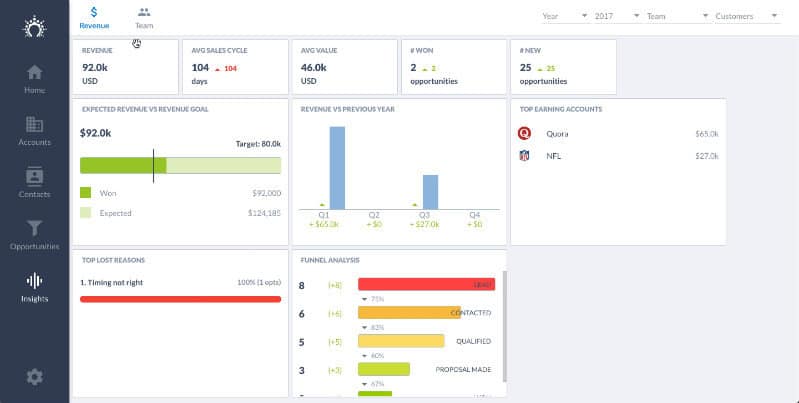
Aimed at B2B companies, Salesflare is a CRM solution that leans heavily on automation to eliminate manual data entry and streamline your workflows. Salesflare will track your leads and tell you when to seize on a sales opportunity by following up, which you can do with the email templates and personalization tools it provides.
Price: The enterprise version is $99 per user per month.
Reviewer Says: “To make a CRM sticky with the team, you need to remove the usual hurdles. Salesflare does this without you even knowing that it has done it.”
5. Pipedrive
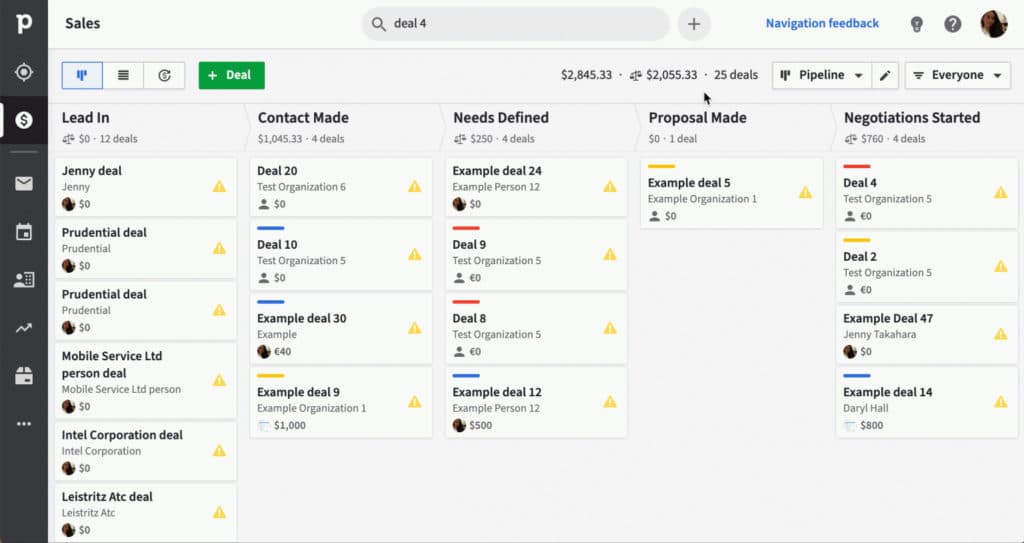
Built first and foremost for sales teams, Pipedrive provides a unique visual interface designed to evoke the concept of the sales funnel. It helps salespeople nurture their leads and follow up on opportunities with a CRM that’s easy to use, customize, and integrate with other products.
Price: Enterprise version is $99 per user, per month.
Reviewer Says: “It really focuses on making reps more productive. If your sales requires a lot of others involved that also need to use the information and share, it is not designed for this.”
6. Salesmate
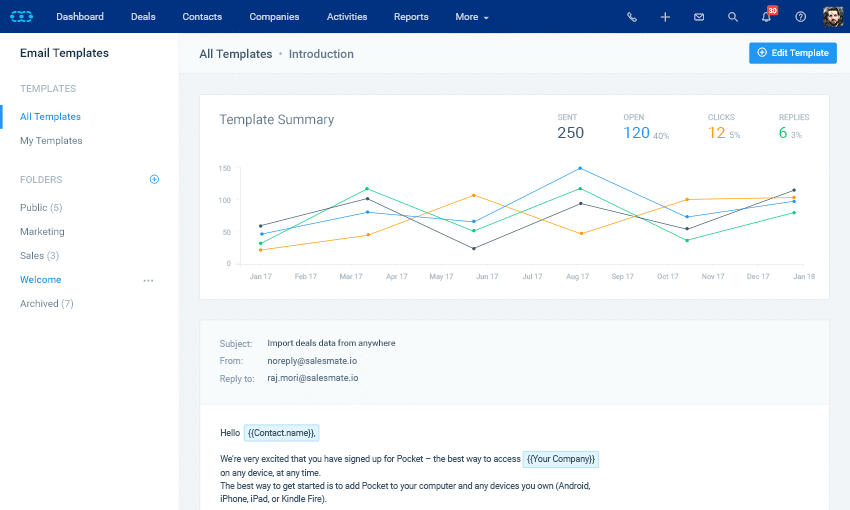
Salesmate is a cloud-based, mobile-friendly solution that can be a great fit for companies that engage in remote sales. Features like sales automation, personalized messaging, and built-in calling make it easy for your sales team to stay connected and collaborate wherever they are.
Price: By request for Enterprise version.
Reviewer Says: “Salesmate works great for cold outreach. We can create automated email campaigns to send out to a list, so the whole process is automated. We can even see stats on who opened each email.”
Conclusion
Smart B2B marketers know that a good CRM helps you understand your customers better. An enterprise CRM can distribute that understanding to everyone in your organization who needs it. It gives them the data and tools to convert more leads, close more sales, and provide superlative customer experiences.
With the right integrations, you can use the rich data held within your CRM to create detailed maps of buyer journeys and increase sales and grow your business. If you want to see your B2B enterprise succeed, one of the best things you can do is invest in the right CRM. Generating more sales and more revenue make it worth the investment.